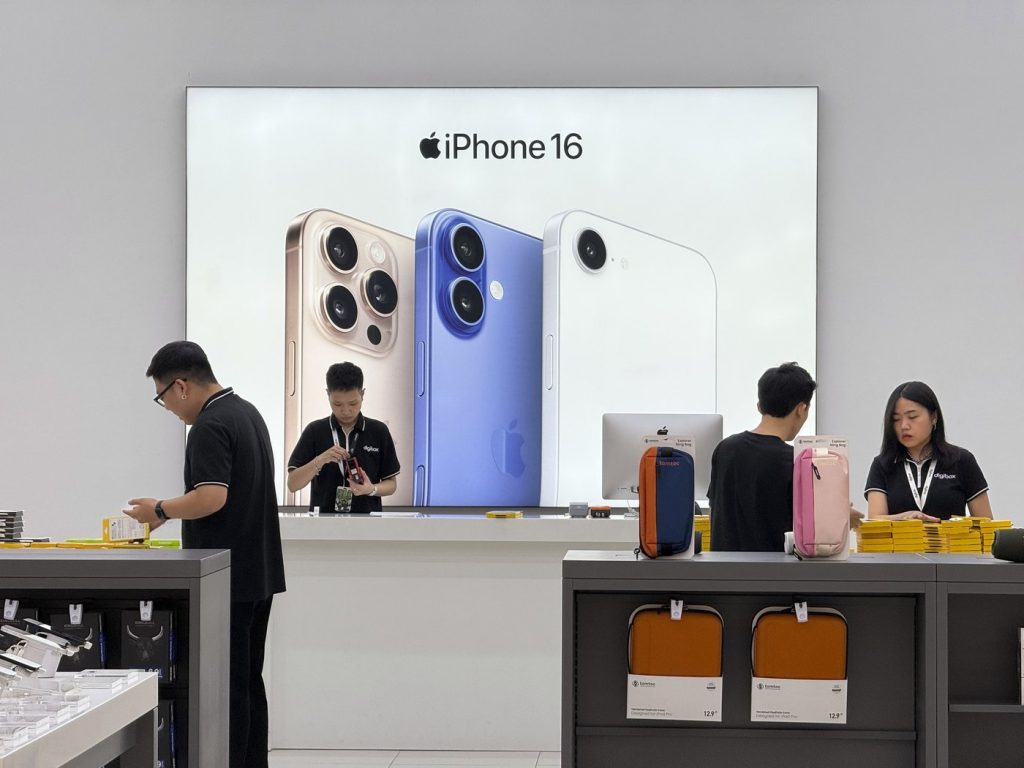SAN FRANCISCO (AP) – The Trump administration has been asserting that its extensive tariffs on Chinese imports will compel Apple to manufacture the iPhone in the United States for the first time. However, this scenario remains highly unlikely, even with U.S. tariffs currently reaching a staggering 145% on products produced in China. Apple has relied on China as its primary manufacturing hub since the iPhone's initial release in 2007.
The obstacles preventing Apple from shifting production to the U.S. are substantial. A complex supply chain, established in China since the 1990s, poses significant challenges. Transitioning to American manufacturing would require several years and billions of dollars in investment to construct new plants, along with economic forces that could potentially triple the retail price of an iPhone. Such a price surge could severely impact sales of Apple's flagship product.
Wedbush Securities analyst Dan Ives articulated this view, deeming the concept of U.S.-made iPhones a "non-starter." He estimated that if production were to move to the U.S., the current $1,000 price tag for an iPhone produced in China or India could escalate to over $3,000. Ives believes that domestic production may not be feasible until at least 2028, stating, "Price points would move so dramatically, it’s hard to comprehend."
Apple has not officially commented on the matter, but it is anticipated that the issue will surface during CEO Tim Cook's scheduled quarterly conference call on May 1, where analysts will discuss the company's financial outcomes and strategies. The topic is significant, particularly as Apple’s stock has dropped nearly 20%, translating to a market value loss of $600 billion since the escalation of tariffs began on April 2.
If these tariffs remain in place, industry experts predict that Apple may eventually have to raise prices on iPhones and its other popular products, given the heavy concentration of its supply chain in China, India, and other regions affected by the ongoing trade conflict. The critical question revolves around how long Apple can maintain its current pricing before the impact of tariffs on its profit margins becomes unsustainable, necessitating a cost shift to consumers.
One key factor allowing Apple to absorb potential tariff-induced cost increases is its lucrative services division, which reported $96 billion in revenue in the last fiscal year. This segment remains unaffected by Trump's tariffs, providing Apple with some leeway to sustain its current pricing strategy in the short term. Forrester Research analyst Dipanjan Chatterjee remarked, "Apple can absorb some of the tariff-induced cost increases without significant financial impact, at least in the short term."
In February, Apple endeavored to appease the administration by announcing plans to invest $500 billion and create 20,000 jobs in the U.S. by 2028; however, this commitment did not include the domestic manufacturing of iPhones. Instead, Apple highlighted its intention to establish a data center in Houston to support artificial intelligence initiatives.
White House Press Secretary Karoline Levitt suggested that Apple's investment pledge indicates the company's belief in the feasibility of U.S. manufacturing, stating, "If Apple didn’t think the United States could do it, they probably wouldn’t have put up that big chunk of change." Similarly, U.S. Commerce Secretary Howard Lutnick expressed confidence on April 6 that tariffs would necessitate a manufacturing shift back to America, suggesting that significant production jobs like those involved in assembling iPhones would return to the U.S.
Contrarily, Apple CEO Tim Cook has previously expressed skepticism regarding the availability of skilled labor in the U.S. to handle the intricate assembly tasks involved in iPhone production, remarking during a 2017 conference in China that the U.S. workforce may not possess enough qualified personnel for such jobs.
Historically, Trump exerted pressure on Apple to relocate iPhone manufacturing to the U.S. during his first term; however, the administration eventually exempted iPhones from tariffs, a period during which Apple indicated a commitment to invest $350 billion in the U.S. Moreover, Apple's pivot in response to tariffs led to a portion of its iPhones being manufactured in India and other products in Vietnam.
In a 2019 tour of a Texas facility where Apple has been assembling some Mac computers since 2013, Cook accompanied Trump, who erroneously claimed to have opened a significant Apple manufacturing plant in Texas.










